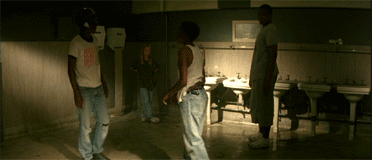George Washington (David Gordon Green) 2000
 George Washington is the best American film of 2000.
Shot stunningly in wide screen (more importantly it's shot with an understanding
of how to use that screen real estate), the film was famously described as Gummo as
directed by Terrance Malick ... but Malick was never this willing to celebrate
his characters' emotions, and the relative aimlessness of Gummo is
replaced with a plot that manages to do what the way-overrated Unbreakable attempted
and failed. To say more about the film's plot would spoil it, I think, and I
don't think this is a film that should be spoiled.
George Washington is the best American film of 2000.
Shot stunningly in wide screen (more importantly it's shot with an understanding
of how to use that screen real estate), the film was famously described as Gummo as
directed by Terrance Malick ... but Malick was never this willing to celebrate
his characters' emotions, and the relative aimlessness of Gummo is
replaced with a plot that manages to do what the way-overrated Unbreakable attempted
and failed. To say more about the film's plot would spoil it, I think, and I
don't think this is a film that should be spoiled.
 The film is filled with hypnotic, dreamlike images. It's
lovely. A stunningly assured directorial debut, the
film is absolutely lyrical in beauty, which makes the fact that it was directed
by a first timer all the more impressive. Perhaps it is precisely because this
is the director's first feature that he is able to create such a wonderful sense
of innocence. Green gets remarkable performances out of a cast that is almost
entirely comprised of amateurs (and most of the large parts are filled by
children.) The film is not afraid to make squalor look beautiful, and one gets
the impression that by making the film look as good as he does, the filmmaker
wants us to not judge the film based on its surroundings, but to rather look at
the universal applications of its themes. That the film manages so to say so
much, and remains filled with warmth makes it feel like an aberration among
American films.
The film is filled with hypnotic, dreamlike images. It's
lovely. A stunningly assured directorial debut, the
film is absolutely lyrical in beauty, which makes the fact that it was directed
by a first timer all the more impressive. Perhaps it is precisely because this
is the director's first feature that he is able to create such a wonderful sense
of innocence. Green gets remarkable performances out of a cast that is almost
entirely comprised of amateurs (and most of the large parts are filled by
children.) The film is not afraid to make squalor look beautiful, and one gets
the impression that by making the film look as good as he does, the filmmaker
wants us to not judge the film based on its surroundings, but to rather look at
the universal applications of its themes. That the film manages so to say so
much, and remains filled with warmth makes it feel like an aberration among
American films.
 It's
an epic 90 minutes long, and completely creates a world to immerse us in. As an
exercise in establishing mood, it is almost peerless. The film's narration, done
by a 12 year old girl, is one of the best uses of narration that I've ever
seen in a film. When the one child says "I hope you live
forever," we're hearing an expression of love from someone too young to
really know what love is. This is a distillation of love into its purest form.
By viewing a group of characters that are equally afraid to grow up or be called
children, we come to understand a world that cannot be fully explained even by
its residents. By defining the dreams and aspirations of the people that
populate it, this masterpiece beautifully manages to create a real-world
superhero that we can believe in too.
It's
an epic 90 minutes long, and completely creates a world to immerse us in. As an
exercise in establishing mood, it is almost peerless. The film's narration, done
by a 12 year old girl, is one of the best uses of narration that I've ever
seen in a film. When the one child says "I hope you live
forever," we're hearing an expression of love from someone too young to
really know what love is. This is a distillation of love into its purest form.
By viewing a group of characters that are equally afraid to grow up or be called
children, we come to understand a world that cannot be fully explained even by
its residents. By defining the dreams and aspirations of the people that
populate it, this masterpiece beautifully manages to create a real-world
superhero that we can believe in too.
****
- Masterpiece
September,
2001
Jeremy
Heilman